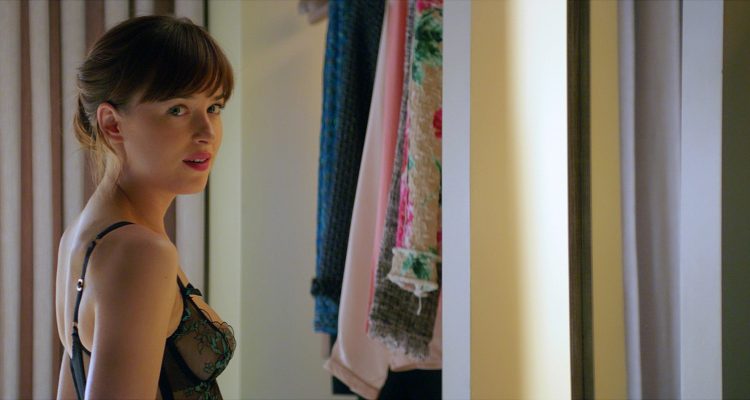If 2015’s “Fifty Shades of Grey” was brutally testing, “Fifty Shades Darker” is torturous. A cinematic soap opera series as sexy and stimulating as laundry detergent, and featuring far less friction, this painfully soporific sensual sequel somehow becomes even less enticing and rousing than Sam Taylor-Johnson’s tediously compromised original. Actively dull and astoundingly flaccid, the monotonously dreary, everlastingly humdrum BDSM fan fiction franchise can never quite decide if it’d rather be smutty or classy. Instead, director James Foley (“Glengarry Glen Ross”) tries to find an ill-conceived, thin, mildly dirty line between the two, evaporating anything alluring, engaging or exciting about this sexual fantasy follow-up in the process. It makes ‘Grey’ look like “Secretary” in comparison. Never has unconventional sex seemed so fucking boring.
Adjusting back to her non-submissive life after Christian Grey’s (Jamie Dornan) “50 shades of fucked up” incident, Anastasia Steele (Dakota Johnson) takes comfort in a new publishing assistant position, where she’s under the tutelage of her smoldering-yet-controlling boss, Jack Hyde (Eric Johnson). Life is comfortably safe, but that doesn’t last long. Creepily and commandingly like before, Christian works his way into Anastasia’s humble life again, promising the bleeding heart and general openness that was lost during their suppressive sexual exhibitions. He’s willing to explore a “vanilla relationship” against his own troubled inhibitions. Though dubious, she’s willing to let Christian’s atypical (and seemingly sincere) vulnerability rekindle their once-shattered relationship. But Christian still remains a little morally….grey.
 Most notably, it’s his continued working relationship with Elena Lincoln (Kim Basinger), the older, sophisticated Mrs. Robinson-esque former lover that’s responsible for Grey’s unusual carnal appetite and seclusive seductive lifestyle habits, that concerns Anastasia the most. Grey continues to assure his reunited lover that there’s no need for concern, but Elena’s thinly-veiled threats and venomously scornful warnings towards Grey’s newest “fling” suggest otherwise. There’s also Leila (Bella Heathcote), a mysterious, self-mutilating hooded stranger who haunts Anastasia on multiple occasions — even when she’s asleep in her room with Grey, post-coital. As it seems, Leila holds an unknown, potentially disturbing connection to Christian’s near past.
Most notably, it’s his continued working relationship with Elena Lincoln (Kim Basinger), the older, sophisticated Mrs. Robinson-esque former lover that’s responsible for Grey’s unusual carnal appetite and seclusive seductive lifestyle habits, that concerns Anastasia the most. Grey continues to assure his reunited lover that there’s no need for concern, but Elena’s thinly-veiled threats and venomously scornful warnings towards Grey’s newest “fling” suggest otherwise. There’s also Leila (Bella Heathcote), a mysterious, self-mutilating hooded stranger who haunts Anastasia on multiple occasions — even when she’s asleep in her room with Grey, post-coital. As it seems, Leila holds an unknown, potentially disturbing connection to Christian’s near past.
While rarely compelling from a narrative perspective, “Fifty Shades of Grey” held a cinematic prowess that’s utterly lost in this defective continuation. Where Taylor-Johnson’s original tried to balance out the plot tedium with sharply-conceived cinematography and firm attention to detail, “Fifty Shades Darker” is visually flat and completely indistinct from a filmmaking standpoint. I’d argue it looks like a TV movie production in comparison to the first, but that would honestly put to shame the finely stylish TV series that’ve sprung onto the tube of late — including Netflix’s “House of Cards,” where Foley played a heavy hand throughout the first three seasons. Whatever finesse, maturation or cinematic conviction Foley found inside that work is now missing.
 Darkness doesn’t bring much to the table here either. Mistaking melodrama with maturity, “Fifty Shades Darker” attempts to brood harder and kink steamier with this lewder, blackened, edgier sequel. But their “kinky fuckery” isn’t inviting. The camera is quick to leer at these sexy leads, watching each amorous development unfold with a knowing wink and a mischievous smile. But it’s more hollow and less stimulating than anything even mildly provoking in the first installment. The sex scenes strenuously look like work for the actors, and that instantly evaporates any-and-all energy within the room.
Darkness doesn’t bring much to the table here either. Mistaking melodrama with maturity, “Fifty Shades Darker” attempts to brood harder and kink steamier with this lewder, blackened, edgier sequel. But their “kinky fuckery” isn’t inviting. The camera is quick to leer at these sexy leads, watching each amorous development unfold with a knowing wink and a mischievous smile. But it’s more hollow and less stimulating than anything even mildly provoking in the first installment. The sex scenes strenuously look like work for the actors, and that instantly evaporates any-and-all energy within the room.
Like before, these leads share a chemistry more comparable to mold on food than anything resembling intuitively developed lovers in the midst of emotionally erotic distress. Despite Johnson’s continued efforts to give a dorky, witty charm to Anastasia, the relationship she shares with Dornan throughout this series is awkward and stiff in all the wrong ways. They barely register as fond acquaintances, let alone deeply passionate, intensely intimate lovers. While some emotional reservation is needed and occasionally justified to build upon Christian’s perpetually-disturbed backstory, there’s not enough genuinely steamy, frenzied lust to balance against Grey’s clearly-unstable psychological well-being. It’s like watching ice playing against ice.

Though author E.L. James and her husband, screenwriter Niall Leonard, had more creative control this time around, the translation to the big screen remains calculated and calibrated in a film that should, by all means, be wild and feverish. The influence of outside voices constantly restricts the filmmakers from doing anything exciting with this flatlined material. If there’s a case to be made against letting authors get involved with their studio film adaptations, “Fifty Shades Darker” makes a damn good argument. Pulseless, perfunctory and persistently watering down its kookier instincts, “Fifty Shades Darker” pales in comparison to the first. You might as well call it “Fifty Shades Duller.” [D+]

